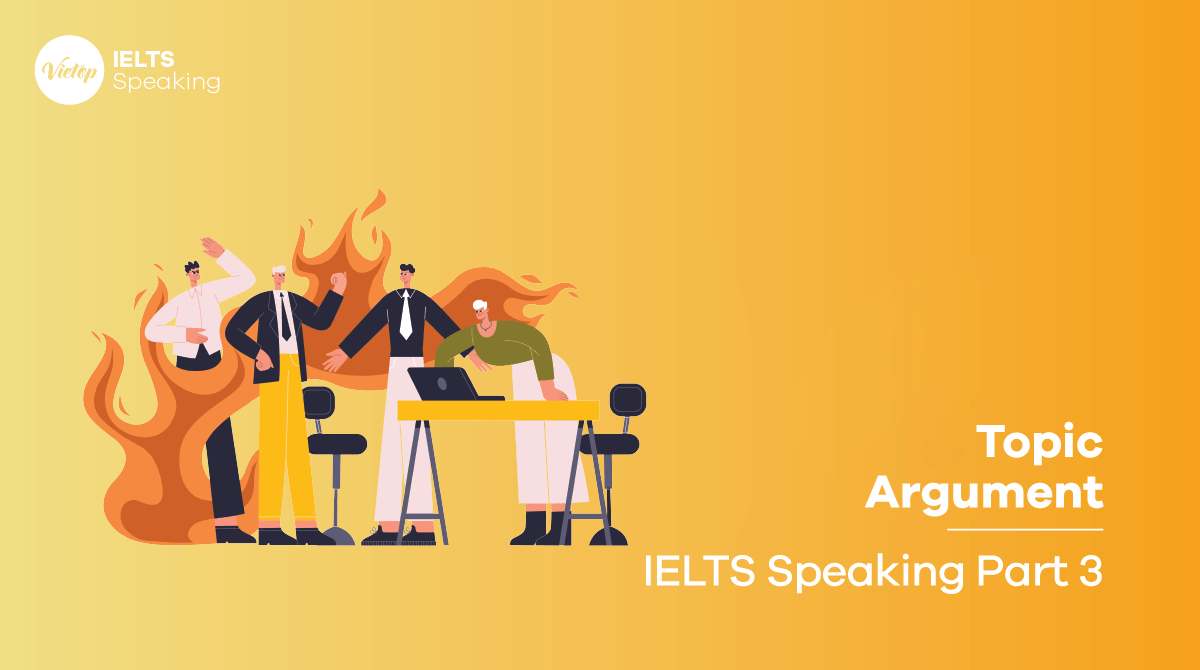Hôm nay, IELTS Vietop mang đến bài viết về IELTS Speaking Part 3 Argument. Đây là một trong những chủ đề thường gặp trong kì thi IELTS, mời các bạn tham khảo qua nhé!
Từ vựng IELTS Speaking Part 3 chủ đề Argument

- Accusation (noun) – sự buộc tội
The accusation that John had stolen the money turned out to be false.
- Aggression (noun) – sự hiếu chiến
His aggression towards his opponent made the argument even more heated.
- Assert (verb) – quả quyết
She asserted that she was innocent, but the jury was unconvinced.
- Assertion (noun) – sự quả quyết
Her assertion that she was innocent was met with scepticism by the jury.
- Attack (noun/verb) – sự tấn công/hành động tấn công
The political attack ads against the candidate were particularly vicious.
He attacked his opponent’s argument with a series of counterpoints.
- Bias (noun/verb) – thiên kiến/thiên vị
The journalist’s bias was evident in the way she reported the story.
The judge was accused of bias towards the defendant.
- Challenge (noun/verb) – sự thử thách/thách thức
The student challenged the professor’s conclusions, leading to a lively debate.
The challenge of convincing the jury was a daunting task.
- Claim (noun/verb) – khẳng định
The company’s claim that their product was the best on the market was contested by their competitors.
The claim that she had witnessed the crime was called into question by the defence.
- Clash (noun/verb) – xung đột
The clash between the two politicians was one of the highlights of the debate.
The two sides clashed over the validity of the evidence.
- Conflict (noun/verb) – mâu thuẫn
The conflict between the two groups had been simmering for months before it finally boiled over.
The conflict of interest was a major factor in the decision.
- Confrontation (noun) – đối đầu, đối chất
The confrontation between the two neighbours over the property line was resolved in court.
- Contention (noun) – tranh chấp, tranh luận
The contention that the earth is flat has been thoroughly debunked by science.
- Contradict (verb) – ngược lại, mâu thuẫn với
The survey appears to contradict the industry’s claims.
- Contradiction (noun) – sự mâu thuẫn
The contradiction in his story raised suspicions about his credibility.
- Debate (noun/verb) – tranh luận
The debate over climate change has been raging for years.
They debated the merits of the proposal for hours.
- Defend (verb) – bảo vệ
The lawyer vigorously defended his client against the charges.
- Denial (noun) – chối bỏ
The accused’s denial of the charges was not believed by the jury.
- Disagreement (noun) – sự không đồng ý
The disagreement between the two friends led to a temporary rift in their relationship.
- Dispute (noun/verb) – tranh luận
The dispute over the inheritance led to a bitter family feud.
They disputed the validity of the evidence.
- Dissent (noun/verb) – bất đồng chính kiến
The judge’s dissenting opinion was a powerful critique of the majority’s decision.
Several members of the committee dissented from the final recommendation.
- Divisiveness (noun) – sự chia rẽ
Transparency will enhance development rather than social divisiveness
- Embroilment (noun) – sự lôi kéo, gây chia rẽ
The company’s embroilment in a lawsuit led to a significant loss of revenue.
- Fact (noun) – sự thật
The fact of the matter is that the evidence does not support the argument.
- Fallacy (noun) – lối ngụy biện
The argument was based on a fallacy and was easily dismantled.
- Frustration (noun) – thất vọng
The frustration of not being able to convince his opponent was evident in his voice.
- Hostility (noun) – thù địch
The hostility between the two sides was palpable.
- Impasse (noun) – bế tắc
The negotiations reached an impasse and broke down.
- Inconsistency (noun) – không nhất quán
The inconsistency in her story raised suspicions about her credibility.
- Inference (noun) – sự suy luận
The inference that the suspect was guilty was based on circumstantial evidence.
- Insistence (noun) – khăng khăng
Her insistence that she was right was beginning to annoy her friends.
- Intensity (noun) – cường độ, sức mạnh
The intensity of the argument was such that it left both sides emotionally drained.
- Interference (noun) – sự can thiệp
The interference of outside parties only served to make the argument more complicated.
- Invalidity (noun) – vô hiệu
The company was fully aware of the invalidity of its patent.
- Issue (noun) – vấn đề
The issue at hand was whether or not to approve the new development.
- Litigation (noun) – kiện tụng
The litigation over the ownership of the property dragged on for years.
- Logic (noun) – logic, hợp lí
The logic of the argument was sound, but some of the premises were flawed.
- Misconception (noun) – quan niệm sai lầm
The argument was based on a misconception about the facts.
- Misunderstanding (noun) – sự hiểu lầm
The misunderstanding between the two parties was quickly cleared up once they talked it out.
- Objection (noun) – sự phản đối
The defense lawyer’s objection was sustained by the judge.
- Opinion (noun) – ý kiến
The argument was largely a matter of opinion.
- Response (noun) – phản ứng
The response to the argument was mixed, with some people agreeing and others disagreeing.
- Standpoint (noun) – quan điểm
The argument was based on the speaker’s particular standpoint on the issue.
- Viewpoint (noun) – quan điểm
The opposing viewpoints on the issue made it difficult to find a compromise.
- Win (verb) – thắng (cuộc tranh luận)
She was able to win the argument by presenting a compelling case.
- Withdraw (verb) – rút lui
He decided to withdraw from the argument when he realized he was losing.
- Worry (verb) – lo lắng
She began to worry that her argument was not strong enough to convince the jury.
- Wound (verb) – làm tổn thương
His comments wounded her deeply and ended the argument.
- Yield (verb) – nhượng bộ
He eventually yielded to her argument and changed his position.
- Zealotry (noun) – nhiệt tâm, lòng nhiệt thành
His zealotry for his political views often led to heated arguments with his friends.
- Zinger (noun) – một quan điểm (dí dỏm) gây ra sự quan tâm, bất ngờ hoặc sốc
She delivered a zinger that ended the argument and left everyone laughing.
Xem ngay: Khóa học IELTS 1 kèm 1 – Chỉ 1 thầy và 1 trò chắc chắn đạt điểm đầu ra

Nhận tư vấn miễn phí khóa học hè
IELTS Speaking Part 3 Argument – Câu hỏi và trả lời sample

Mời các bạn nghe Audio topic Argument part 3 tại đây nhé!
Do you think arguments are important?
Yes, I do think arguments can be essential. They can help individuals express their ideas and opinions, promote critical thinking, and lead to productive solutions to problems. However, arguments should be conducted respectfully and constructively to ensure positive outcomes.
- Essential (adj): cần thiết
- To promote (v): thúc đẩy
- Critical thinking (n): tư duy phản biện
- Productive (adj): năng suất
- To be conducted (v): được tiến hành
- Constructively (adv): (hành động, tiến hành) theo lối mang tính chất xây dựng, đóng góp
- To ensure (v): chắc chắn
- Outcome (n): kết quả
Xem thêm: Khóa học IELTS Cấp tốc – Cam kết tăng ít nhất 0.5 – 1.0 band score SAU 1 THÁNG HỌC
What do family members often argue about?
In my view, family members would argue about a variety of things, such as household chores, finances, parenting styles, and personal habits. These are all common topics that can lead to disagreements and tension within families. Anyway, it’s important to communicate respectfully and try to find a compromise to resolve these issues.
- Household chores (n): công việc nhà
- Finances (n): tài chính
- Parenting (n): nuôi dạy con cái
- Tension (n): căng thẳng
- Anyway: dẫu sao thì
- Compromise (n): thỏa hiệp
- To resolve (v): giải quyết
Tham khảo:
- Top chủ đề thường gặp ở phần thi IELTS Speaking Part 3
- Cách trả lời IELTS Speaking Part 3 trong các tình huống khó
- Các dạng câu hỏi trong IELTS Speaking Part 3 thường gặp
Is it easier to have arguments with family or friends?
In my personal experience, I find that it’s usually easier to argue with friends than with family. When we argue with friends, we may feel more comfortable expressing our point of view and emotions because we don’t have the same obligation to maintain harmony as we do with our family. But, that doesn’t mean we should be disrespectful or unkind during disagreements. It’s important to always approach arguments with respect and try to find a solution that works for everyone, whether it’s with friends or family.
- To express (v): thể hiện
- Point of view (n): góc nhìn
- Emotion (n): cảm xúc
- Obligation (n): nghĩa vụ
- To maintain (v): duy trì
- Harmony (n): sự hòa hợp
- Disrespectful (adj): không tôn trọng
- Unkind (adj): không tử tế
- To approach (v): tiếp cận
Xem ngay:
- Topic sport – Bài mẫu IELTS Speaking part 1, 2, 3
- Bài mẫu Topic Value – IELTS Speaking Part 3
- Bài mẫu Topic Intelligence – IELTS Speaking Part 3
Học IELTS hiệu quả với giáo viên giàu kinh nghiệm. Tham gia ngay khóa luyện thi IELTS 4.0
Do you think people should change the way they think when having arguments?
Yes, I think people should try to change the way they think when arguing. It’s necessary to approach arguments with an open mind and be willing to consider other perspectives. By doing so, we can broaden our understanding of the issue and potentially come up with a more effective resolution. Additionally, I think it’s important to remain calm during arguments to ensure a productive discussion.
- Open mind (n): tâm trí cởi mở
- To consider (v): cân nhắc
- Perspective (n): khía cạnh
- To broaden (v): mở rộng
- Potentially (adv): có tiềm năng
- To remain (v): giữ, duy trì
Trên đây là phần IELTS Speaking Part 3 Argument – Câu hỏi và trả lời sample. Hy vọng bài viết sẽ là nguồn tham khảo tốt cho các bạn trong việc học và chuẩn bị cho kỳ thi IELTS. Chúc các bạn học tốt!
Xem thêm:











